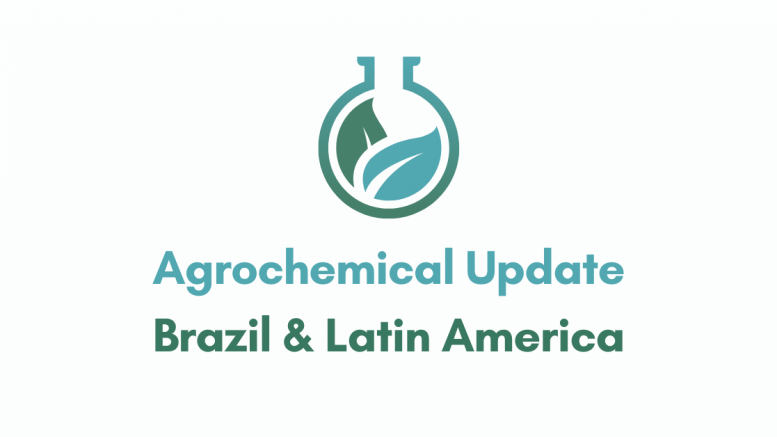Amaggi to launch an online sales platform
Brazil
In compliance with court decisions, Anvisa approved the toxicological evaluation of the pesticides prothioconazole (Ouro Fino); clomazone (Rainbow); trifloxystrobin + cyproconazole (CHDS); and mancozeb (Indofil). (Anvisa)
Amaggi to launch an online sales platform on July 28th, where it will be possible to purchase pesticides, fertilizers and seeds. According to a survey by McKinsey with 5,500 farmers, 70% of them use digital channels when purchasing inputs. (McKinsey; Amaggi)
Soybean production costs decreased in the State of Mato Grosso. Average price of soybean seeds had a reduction of 22.2% in June, compared to the same period of 2022. Fertilizer prices decreased 23%. Average costs of pesticides for soybean decreased only 0.8% in the period. (Imea)
Bioinputs received special conditions in the 2023/24 Harvest Plan (Brazilian government financing plan). Farmers who adopt more sustainable practices, as in the case of the use of bioinputs, will receive a 0.5% discount on the interest rates for crop funding. “Bioinputs are tools that promote environmental and business sustainability, given that they help to leverage the farmer’s yields using fewer financial resources and contributing to the protection of the earth for future generations. Therefore, this highlight given in the Harvest Plan is essential for sustainability”, says the CEO of Gênica, Marcos Petean. (Gênica; MAPA)
In seven years, Superbac’s revenue grew more than 40 times. In 2022, the company earned US$ 250 million from the sale of biofertilizers. (Superbac)
More than 100 million bees died in Sorriso, State of Mato Grosso, after fipronil was wrongly applied by airplane. Beekeepers of the Teles Pires Valley Association reported the case to the Institute of Agricultural Defense of Mato Grosso, that inspected 22 farms in the region. The owner of the farm where the product was applied may be charged for an environmental crime. (Indea)
130 million doses of biological inoculants were sold in 2022, 80% of which were used in soybean. For the executive director of the National Association of Manufacturers and Importers of Inoculants, Solon Araújo, farmers are increasingly seeking biological inputs. “Today we can already say that biological products are becoming not an alternative, but the first option for many crops”, according to Araújo. (ANPII)
Syngenta has US$ 168.13 million available for granting rural credit through the company’s barter program, that offers resources for farmers to purchase fertilizers as long as they commit to purchasing the company’s pesticides. (Syngenta)
According to researchers Crébio Ávila and Charles de Oliveira (Embrapa), and Ivana da Silva (Federal University of Grande Dourados), the spraying of insecticides on the aerial part of corn plants is resulting in a low control efficiency (< 50%) of the elasm caterpillar (Elasmopalpus lignosellus), because of the position in which the insect stays in the plant. The treatment of corn seeds with systemic insecticides, especially containing neonicotinoids alone or mixed with pyrethroids, carbamates or diamides, has been shown to be an efficient practice for the control of the caterpillar. (Embrapa Agropecuária Oeste; Embrapa Cerrados; UFGD)
Fertilizers represent a significant share of grain production costs, reaching 25% to 30%. In wheat farming, nitrogen fertilization is directly related to yields: “The application of nitrogen in the soil in wheat farms is one of the safest management practices in terms of return on investment. Research shows that efficiency in the use of nitrogen ranges from 12 to 21 kg of grains for each kg of nitrogen added”, according to Embrapa’s researcher Fabiano de Bona. (Embrapa Wheat)
Reopening of the Nitrogen Fertilizer Factory at the State of Paraná and conclusion of works at the Nitrogen Fertilizer Factory at the State of Mato Grosso do Sul could reduce by half the Brazilian fertilizer
Agrocete, a Brazilian plant nutrition company, had a 36% increase in the number of customers served between 2018 and 2022. The company recorded an increase in the amount of sales of 82% and 132% in the value of sales during the period. (Agrocete)

Latin America
Ban of glyphosate in the province of Misiones, Argentina, will only come into force after two years, but exporters claim that there are already negative economic effects. Buyers of Argentine products are demanding information and certifications on how weed control will be carried out, as there is no effective substitute for glyphosate. “The elimination of glyphosate can’t be imposed by the State. In addition, it will encourage the use of more harmful pesticides”, according to a note from Unión Cívica Radical. (Agrosite; Unión Cívica Radical)
Government of Argentina confirmed a new tax law on imports, called PAIS – Tax for an Inclusive and Solidary Argentina, that should be of 7.5%, and includes agricultural inputs. The tax will be implemented through an exchange rate unification process, as requested by the IMF. (Ministry of Economy of Argentina)
Chamber of Phytosanitary Products and Fertilizers of Paraguay and Universidad Columbia del Paraguay signed an agreement to train university students and professors on good agricultural practices and in the safe handling of pesticides. A work team will be formed by the two entities. (Cafyf)
Researchers and civil society organizations in Mexico sent an official letter to the Ministry of Health requesting for a ban on pesticides containing chlorpyrifos-methyl and chlorpyrifos-ethyl. Accord

READ MORE:

